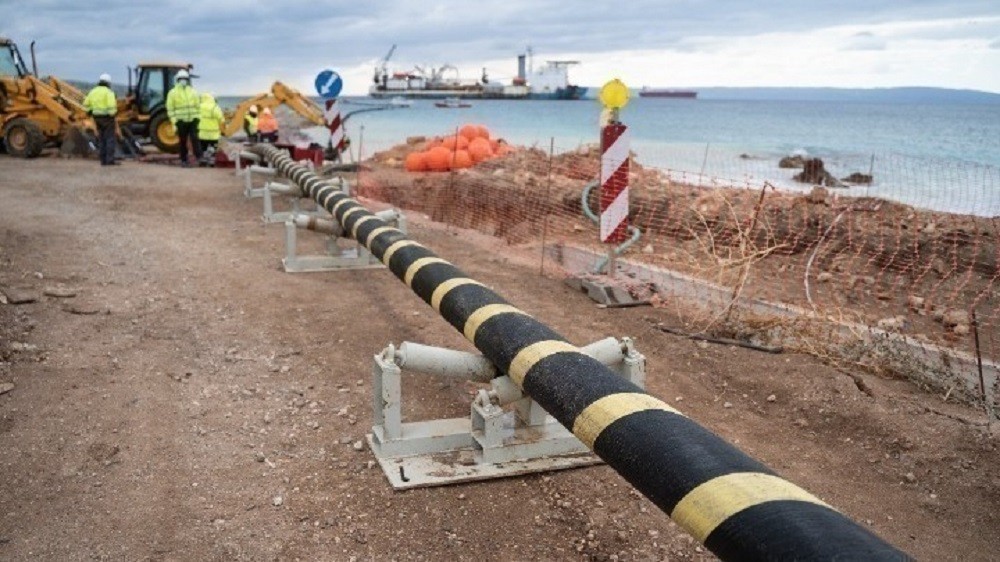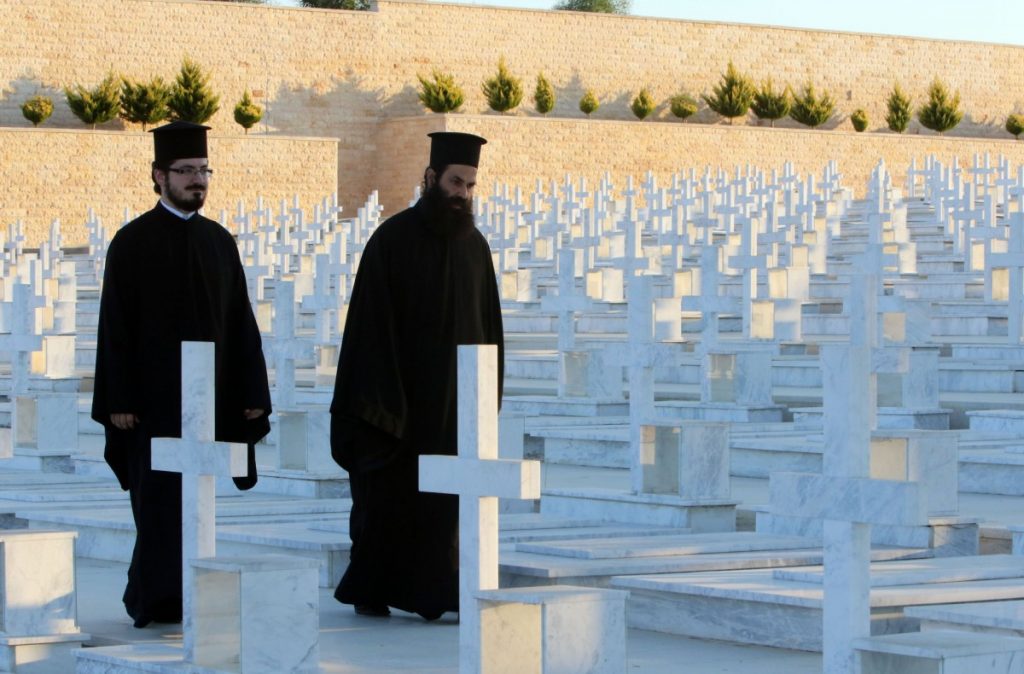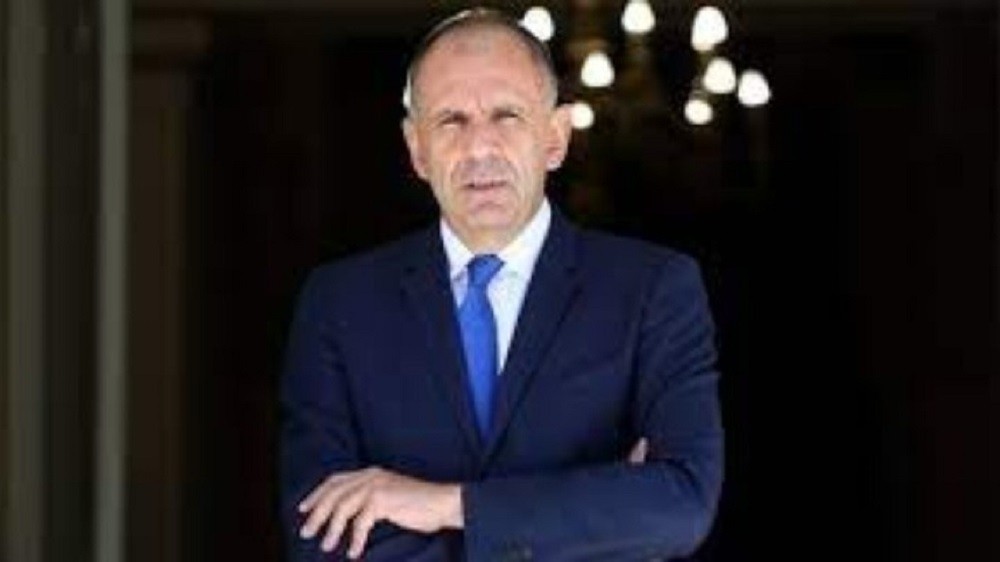
The Munich agreement of 1938 (unfair to the Czechs and dishonorable for the UK), East Timor and Cyprus

File Photo: Ιερείς και συγγενείς πεσόντων αξιωματικών και οπλιτών κατά την τουρκική εισβολή του 1974 στο στρατιωτικό κοιμητήριο στον Τύμβο Μακεδονίτισσας. ΚΥΠΕ, ΚΑΤΙΑ ΧΡΙΣΤΟΔΟΥΛΟΥ
It is indeed a considerable shame that prime movers on the international scene dealing with the Cyprus problem, who should know better, totally ignore the lessons of Munich and East Timor.
Winston Churchill called World War II “the unnecessary war”, and he insisted that the sell-out of Czechoslovakia by France and Great Britain in Munich as one such moment, even late, where war could have been stopped in its tracks. Briefly stated, what happened in Munich in September 1938 was the betrayal by the Western democracies, and formal allies of the Czechoslovak Republic, of this very alliance, by bowing to Hitler’s ultimatum that the Czech territory inhabited by Sudeten Germans in the North-west part of Czechoslovakia be ceded to Nazi Germany, within a month’s time.
What was then mislabeled by British PM Neville Chamberlain as “peace with honor” and “peace in our time”, was to last less than six months, as in that time Hitler moved to occupy all of remaining Czechoslovakia, in order to “protect” her. In the preceding years the leader of the Sudeten Germans Konrad Henlein, was in very close contact with the Nazi leadership in Berlin, and under orders never to appear satisfied with any concessions the Czechoslovak Government would offer to the German minority.
Rather he was to think of new demands, all the time! Self-determination for the Sudeten Germans had been one of the Nazi demands, which several in the western democracies looked kindly upon! The end of the war found the Sudeten Germans extremely disliked, to say the least, by the citizens of Czechoslovakia, so much so that it was decided at the Postdam Conference (1945) that over 3 million Sudeten Germans were to be expelled to Germany and the territory ceded to Germany during the Munich agreement would revert back to Czechoslovakia. Several edicts issued by Czechoslovak President Benes sped up the process.
- The descendants of the expelled Sudeten Germans have time and again been pressing for a return to their ancestral lands, yet the previous Czechoslovak Republic as well as the current Czech Republic has been adamant in her refusal. President Havel actually held up the revision of the Lisbon Treaty of the European Union to ensure that there were no provisions which under any pretext would allow a return of the descendants of the Sudeten Germans back into the lands of their ancestors.
When on successive official state visits to Czechoslovakia in September 1990, French President François Mitterand and British PM Margaret Thatcher expressed their regret at their countries push for the Munich agreement, which delivered Czechoslovakia to the Nazis, despite the defence treaties of these two western democracies with the Czechoslovak Republic (there was also a defence treaty of Czechoslovakia with the Soviet Union, but it was so phrased that help from that quarter would come only if France and the U.K. upheld their obligations first). Telford Taylor, late professor of law at Columbia University and Chief US prosecutor at the Nuremberg trials, in his book “Munich, the price for peace” is quite revealing of PM Chamberlain’s sorry and pitiful performance at the time, who called the UK-treaty-bound Czechoslovakia “a far away land about which we know nothing”!
If one is to briefly dwell on the opinions offered within the British Cabinet of PM Chamberlain during those fateful days of September 1938, one is truly appalled by the snobbism towards every foreigner by the PM (Chamberlain called Hitler “the commonest little dog he had ever met”), and utmost contempt for decency and human values, shown by many cabinet members. Telford Taylor in his book on Munich, offers us numerous examples of this contemptuous regard for decency that prevailed in the British cabinet meetings. Lord Maugham, Lord President of the Council, supported the PM by claiming that no vital British interest was at state. The first of the only two voices in the cabinet against appeasement towards Hitler came form Duff Cooper, First Lord of the Admiralty, who claimed in response that “the main interest of this country has been to prevent any one power from obtaining undue predominance in Europe; but we were now faced with the most formidable power that had ever dominated Europe, and resistance to that power was quite obviously a British interest”.
Subsequently, Thomas Inskip, Minister of Coordination of Defense, replied that the UK would not be fighting for Czeckoslovakia but to “check Herr Hitler”, the result being changes in Europe that “would be satisfactory to no one except Moscow and the Boslsheviks [note: how about the unfortunate Czechs?]”. Next, Lord Zetland (Secretary of State for India and Burma) pointed out that the lesson of self-determination in the Sudetenland would not be lost in India, but then concurred with Inskip that war would benefit “those who controlled the destinies of Russia”.
In agreement with the PM’s policy was Malcom McDonald (Colonial Secretary) who asked for “reasonable conditions”, while Samuel Hoare (Home Secretary) asked for a quid pro quo from Hitler! The most adamant opposition to the PM’s plans in the cabinet came from the Lord Privy Seal, Earl “Buck” De La War, who while not disclaiming a plebiscite for self-determination in general, declared that an immediate one in Sudetenland, that would obviously take place due to Nazi threats, as “unfair to the Czechs and dishonourable to ourselves”. He added the obvious, i.e. that a less than honourable peace soon would result in war; his statements would prove prophetic in less than a year’s time!
- Even more stunning were the attempts by Lord Halifax, Foreign Secretary, to amplify on what Lord Maugham had claimed, i.e. that no vital British interest was at stake: he claimed that an attack on Czechoslovakia was not the same thing as an attack on the Isle of Wright [note: one then wonders at the value of British signatures on defense and guarantee treaties]. Further, that war against Nazi Germany in defence of Czechoslovakia would be “defensive”, i.e. in order to prevent a greater war from breaking out, rejecting altogether the power of deterrence in order to defend treaties and thus the peace.
The Foreign Minister also took care to warn the cabinet against appearing to have made up their mind, as the French PM and members of his cabinet were to arrive soon for consultations!! All in all, all sorts of pretexts were found to sell Czechoslovakia down the river; six months later, when Hitler moved to occupy all of Czechoslovakia the PM was to proclaim in the cabinet that the spirit of the Munich agreement had been violated by Germany; the attack on Poland, and World War II would come less than a year after the Munich agreement.
The relationship of the Turkish Cypriot (TC) leadership to Turkey from the 1950s onward, can hardly be regarded as any different from that of the leader of the Sudeten Deutsch, Konrad Henlein, to his Nazi bosses. Indeed the legendary TC leader Rauf Denktash who was actively involved in his community’s affairs from the 1950s until just a decade ago, stated bluntly as far back as 1957 “that even if no TC existed Turkey would have to invent them”, a statement that is quite revealing of the intentions of both himself and Turkey, and recently repeated by Turkish FM Davutoglu. One can easily get a sense of this mindset from the book of Martin Packard, a British Naval Officer who served on the field in Cyprus during 1964, as head of the tripartite patrols aimed at active re-engagement between Greek Cypriots (GCs) and TCs. Decades later, it was admitted by a former head of Turkey’s intelligence services, ret. General Sabri Yirmibesoglu, that in order to psyche up the TCs against the GCs “we even burnt down a mosque [in Cyprus]”.
This action of course goes hand-in-glove with several acts of provocation by the Turkish state throughout the 20th century, such as the pogrom against the Greek Community of Istanbul in 1955, on the staged pretext of a bombing of the Turkish Consulate in Thessaloniki (and presumed birthplace of Kemal Attaturk). Since 1974, and under a flimsy pretext of “restoring constitutional order” Turkey initiated a bloody military invasion of Cyprus that in a month’s time has left about 5000 dead (ca. 1% of the country’s population), over 1500 missing, and some 200,000 Greek Cypriots (GCs) as refugees in their own land fleeing from the massacres of the invading Turkish Army; the latter came to occupy ca. 40 % of the island, roughly the part closest to Turkey. At the same time, and with some cunning help from the British, all TCs in parts of the island not controlled by the Turkish Army were flown to Turkey through the British Military Bases in Cyprus, and then back to the part of Cyprus occupied by the Turkish Army, six months after the invasion, in February 1975. In this way, the T/C population, previously scattered all over the island, was now gathered in the north part of it, under the illegal occupation of the Turkish Army…
Turkey has put under its occupation the richest part of Cyprus (most industrialized, most fertile, with the most tourist infrastructure, in short the part responsible for over 70 % of Cyprus’s GDP), and managed to run it aground in the ensuing 39 years: a sizeable part of the TCs left, in no small measure due to the policy of free migration from Turkey (“one Turk leaves another enters” has been the motto) in gross violation of all international laws (no acts of war can be sanctioned, neither the derivatives of such acts such as forced migration, ethnic cleansing, emigration etc). The TCs have been reduced to a minority of ca. 90,000 persons in the occupied part of Cyprus, with over 200,000 illegal settlers from Turkey, above and beyond the 40,000 troops from the Turkish Army of occupation. The chief industries are mafia-style casinos, illegal in Turkey under the Islamic government, constituting the major source of revenue in a region under the total control of the Turkish Army! It is no surprise that there were massive demonstrations by TCs in the last 3 years asking that the Turkish Army of occupation and the illegal settlers to go back to Turkey!
The demonstrators caused the extreme anger of PM Erdogan, who in essence replied that Turkey has been footing the bill for the upkeep of the TCs, so they better tow his line, (or else leave Cyprus, which would suit Turkey even better!). To those not in the know, suffice it to say that all T/Cs, anywhere in the world, are entitled to passports of The Republic of Cyprus and can enjoy all the benefits of EU citizens (except that an army of occupation is governing every bit of their lives …).
- Turkey still refuses to recognize the official government of the Republic of Cyprus (recognized by the UN and all other governments in the world!), a decision that has cost it an EU-Council level decision to freeze at least 8 EU accession chapters. Erdogan’s intransigence was made plain again on his recent visit to Poland, where he declared that no such thing as The Republic of Cyprus exists. Why otherwise strict UN and EU officials choose to reward such hard-headed intransigence and gross violation of ordinary diplomatic decencies is beyond comprehension.
Another repulsive development in occupied Cyprus has been the immeasurable loss of cultural treasures from that part of the island, due to illegal excavations of archeological sites, outright thefts from churches etc. It has been decided long time ago by the European Courts that Turkey in general and the Turkish Army of occupation in particular, are responsible for everything that takes place in occupied Cyprus; hence these illegal excavations and thefts could not take place without Turkey’s complicity, if not outright encouragement. Desecration of churches and cemeteries (Armenian, Catholic, Greek Orthodox and Jewish) has taken place repeatedly. Recently, a sizeable collection of over 150 pieces of illegally-seized cultural treasures were flown back to Cyprus, after the decision last March of the Munich Appellate Court to restore these pieces, found in possession of a Turkish art trader in Munich (!), to their rightful owner, i.e. The Republic of Cyprus. How is that for the “dialogue of civilizations” that PM Erdogan is promoting, to say nothing of Turkey’s rightfully adamant policy of demanding return of cultural treasures stolen from her land! Double standard is the rule of the day for Erdogan.
In this context, and despite several UN resolutions calling on Turkey to withdraw her troops from Cyprus, there is hardly any movement from anywhere to pressure Turkey to do the obvious; worse yet, hardly do we hear an expression of regret from anyone that two NATO allies were allowed, one to stage a coup and the other to follow with an invasion of an independent country, under flimsy pretexts. President Clinton in his visit to Greece in 1999 expressed his regret that the US had supported the military junta of Athens in the years 1967-74, yet he had no words of regret for the junta’s last action which was the coup in Cyprus that set the stage for the bloody Turkish invasion! The only expression of regret from a US official at the developments in Cyprus came from Richard Holbrook, who when interviewed on Greek state TV in 1995 stated that “The US did some shameful things in the 60’s and the 70’s in the Eastern Mediterranean, and that’s all I am going to say about it”, a statement which was not at the spur of the moment, as he would again characterize US actions over Cyprus as “shameful”, two years later.
In a different corner of the world, that of East Timor in South East Asia another bloody invasion took place in December of 1975 by the Indonesian Army, again under the flimsy pretext of restoring order. While the world also condemned this action, the Indonesian Army felt free to exercise bloody control over the local population (exclusively Catholic and hardly welcoming uninvited invaders), with estimates of over 100,000 deaths. The continued protests of a world-wide movement for Free East Timor finally took hold in 1999 (after the death of Indonesian President Suharto), and the UN was able to eventually practice what it preached, i.e. oversee a free plebiscite in which the East Timorese overwhelmingly voted for independence, that meant withdrawal of all Indonesian occupation troops.
The parallels between Czechoslovakia of 1938 and Cyprus are overwhelming, as are those between Cyprus and East Timor. After the Munich agreement of 1938 the English writer TS Elliot wrote that “civilization suffered”. Indeed, it received an even more lasting blow, as this agreement was the springboard for Hitler to launch his attack on Poland a year later and start the Second World War, with over 50 million dead. While the illegal occupation of Cyprus for nearly 40 years may not portend an impending Armageddon, it is no less a very grim reminder that a great injustice has been committed on the people of Cyprus, but without any apologies offered by the chief culprits, and hardly a desire to make up for such injustices; just as with Czechoslovakia from 1938 to 1945, and East Timor from 1975 to 1999, albeit without the resolution of the conflict.
While Germany and Indonesia have come to terms with their recent past and have demonstrated genuine signs of regret and remorse over wrongdoing, the same can hardly be said of Turkey. The least that the people of Cyprus can expect from officials dealing with the Cyprus problem, such as EU enlargement commissioner Stefan Fule (a native of the Czech Republic) and UN Secreatry General’s representative to Cyprus, Alexander Downer (a former Australian FM), as well as the countries involved is to see the obvious and not forget the lessons of Munich and of East Timor. After all, any solution has to be fair for the indigenous Cypriots and honourable for the UN, the EU, as well as individual countries claiming to have “an interest” in Cyprus.
*George K. Papadopoulos, Ph.D., is professor of Biophysics and Biochemistry at the Epirus Institute of Technology, in Arta, Greece. The views expressed here are exclusively his own.
This article is dedicated to all those who have defended the independence of the Republic of Cyprus, and to the memory of the late US Senator Wayne Morse (D-Oregon), a champion of international law.
Notes:
Telford Taylor, Munich: the price of peace. Vintage Books. New York, 1980. Even after 40 years this remains the definitive study of the matter, by the late Chief US Prosecutor in the Nuremberg Trials, and later professor of law at Columbia University. The cabinet session in question is described on pages 749-751.
Matthew Jardine, East Timor: Genocide in Paradise (The Real Story Series), Odonian Press; 2 Sub edition, 2002.
Perry Anderson, The Divisions of Cyprus. London Review of Books, 24 April 2008.
Fanoula Argyrou, Bloody Truth. Movement for Freedom and Justice for Cyprus. Nicosia, 2009 (in Greek and English).
Thomas D. Boyatt, “Why Kissinger was Wrong”. In The US and Cyprus: Double Standards and the Rule of Law, ed. Eugene T. Rossides and Van Coufoudakis, 323-325. Washington, D.C.: The American Hellenic Institute Foundation, 2002.
Winston L.S. Churchill. The history of the Second World War. Mariner Books, London, 1986.
Van Coufoudakis, Cyprus—A Contemporary Problem in Historical Perspective.Minneapolis: Minnesota Mediterranean and East European Monographs-University of Minnesota, 2007.
Van Coufoudakis, The Republic of Cyprus at 50. A paper presented at the conference on the Fifty Year Anniversary of the Republic of Cyprus in Washington, DC, on October 4, 2010 sponsored by American Hellenic Institute Foundation.
Dilek Guven, “Nationalism, social changes and minorities: the events against Turkey’s non_Moslems, 6/7 September, 1955”. Estia Bookshop, Athens, 2006. (in Greek). —Nationalismus Und Minderheiten: Die Ausschreitungen Gegen Die Christen Und Juden Der Türkei Vom September 1955 (Südosteuropäische Arbeiten). De Gruyter Oldenbourg, 2012. Also in Turkish.
Christopher Hitchens, Hostage to History: Cyprus from the Ottomans to Kissinger. Verso, London, 1997.
Robert Holland, Britain and the Revolt in Cyprus, 1954-1959. Oxford University Press, Oxford, 1999.
Michael Jansen, War and Cultural Heritage: Cyprus after the 1974 Turkish Invasion.
Minnesota Mediterranean and East European Monographs, no. 14. Minneapolis: University of Minnesota, Modern Greek Studies, 2005.
Robert Keeley, The Colonels’ Coup and the American Embassy: A Diplomat’s View of the Breakdown of Democracy in Cold War Greece. PennState Press, 2010.
Stanley Kyriakides, Cyprus-Constitutionalism and Crisis Government. Philadelphia: University of Pennsylvania Press, 1968.
William Mallinson, Cyprus: a modern history. I B Tauris & Co Ltd; Revised edition edition, London, 2008.
William Mallinson, Partition Through Foreign Aggression: The Case of Turkey in Cyprus. Minnesota Mediterranean and East European Monographs no. 20. Minneapolis: University of Minnesota, Modern Greek Studies, 2010.
Anna Marangou, script on films: https://www.youtube.com/watch?v=RchNmZRz8go, and,https://www.youtube.com/watch?v=xp7FHYPUKVg.
Lobby for Cyprus, Turkey’s assault on the Hellenic heritage of Cyprus.https://www.youtube.com/watch?v=u7TAc8kY4BI&list=PL904B03DBA2EF11E0&index=10. All three films provide ample detail on the destruction of cultural heritage in the occupied part of Cyprus.
Brendan O’Malley and Ian Craig. The Cyprus Conspiracy: America, Espionage and the Turkish Invasion. I.B. Tauris, London, 2001.
Martin Packard, Getting it wrong: excerpts from a Cyprus diary. Author House, London, 2008. The story of the events in Cyprus during the first six months of 1964 as told by the British officer leading the tripartite peace patrols: which foreign powers persistently wanted the partition of the island, as far back as then.
Stella Soulioti, Fettered Independence: Cyprus: 1878–1964. 2 vols. Minnesota Mediterranean and East European Monographs, no. 16. Minneapolis: University of Minnesota, Modern Greek Studies, 2006.
Spyros Vryonis, Jr. The Mechanism of Catastrophe: The Turkish Pogrom of September 6 – 7, 1955, and the Destruction of the Greek Community of Istanbul. Greekworks.com, New York, 2005.
Lefkios Zafeiriou, Kwstas Nikoalidis, Miltos Miltiadous, Marianna Mamidou, Van Coufoudakis. A loss of a civilisation: the destruction of cultural heritage in occupied Cyprus. Government of the Republic of Cyprus Public Information Office, Nicosia, 2012. In several European languages.
http://ahiworld.org/media-center/press-releases/2001/486-ahi-statement-on-the-27th-anniversary-of-turkeys-invasion-of-cyprus.html, reports on statement made by Richard Holbrook regarding Cyprus.

